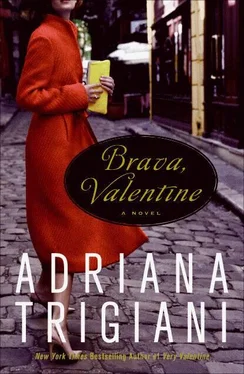He waits patiently until I speak. He doesn’t interrupt me. He lets me find my point, and then gives me the time to share it. “I am trying to say that I love your letters. They are very descriptive and honest…and I feel so much when I read them.”
“ Grazie ,” he says, then amends. “ Mille grazie .”
“I guess, what I’d like to tell you is to…keep them coming. And if you do, I will read them with as much care as you take when you write them.”
“Valentina, I must see you.”
“When?” I ask him.
“I wish today.”
“Me too,” I tell him, and I mean it.
“Now, in the shop here, it is difficult. My father is a new man with a new life. The old life holds very little interest to him now. So, I work twice as long each day.”
“The same at my shop.”
“We’re in, how do you say it?”
“The same boat!”
“Right. Correct. That makes us closer still? No?” he asks.
“Yes,” I tell him.
When I return to the shop, Gabriel and June are laughing at the cutting table. There is something so natural about the two of them working side by side.
Gabriel wasn’t around as much when he lived in Chelsea, but now that he is about to move in, there isn’t any aspect of life on 166 Perry Street that he isn’t a part of-and that includes the shoes.
“What’s going on?” I hang up my coat and look over at Alfred, whose head is buried in a file.
“June is teaching me how to cut patterns,” Gabriel says. “I’ve decided to make the drapes for the living room myself.”
“Do you think you can?”
“You should know better than to ask that question. I can do anything I set my mind to.”
“He’s very good, this guy. Very quick,” June says. “He has a real eye for dimension-which is the one attribute every pattern cutter needs.”
“And when I choose to learn something new, I insist I learn from the master,” Gabriel says.
“Well, that’s me, kiddo.” June cackles. “Thirty-plus years with these pinking shears. I’d say that makes me the master.”
“You feel like a coffee break?” Gabriel asks her.
“Sure,” June says.
“I made blondies with walnuts.” Gabriel looks at me and Alfred.
“I’m okay,” Alfred says without looking up.
“Me too. Late lunch. You go.”
June and Gabriel head up the stairs.
“Dad got an all-clear.”
“Great,” Alfred says.
“You couldn’t be more thrilled.”
He puts the file down. “What do you want me to do? Dance a jig?”
“No. I’d like you to show up,” I tell him. “You’ve never been to the hospital-not when Dad had the surgery, or the chemo, or the radiation-you just leave it to us. And it’s not fair.”
“If you remember, I got him into Sloan, and I paid for the extras. I’ve done my bit.”
“You’re his only son.”
“Yeah, well, that’s its own reward, isn’t it?” he snaps. “I don’t want to fight with you, Valentine,” he says wearily.
“No. You’re fighting the whole world, and then I’m forced to live in it.”
“What does that mean?”
“You don’t get along with people. You take a defensive position. Or you issue an order and expect me to fall in line. You decide we’re going to make the Bella Rosa in China, and that’s how it’s going to be. You steamroller me, you make Bret unhappy…”
“Oh, now I’m responsible for Bret’s happiness?”
“When you’re working with him, you are. Because he matters to me, I value his opinions, and he’s stepped up for this company.”
“He’ll get his commission.”
“That’s not the point. He didn’t have to take us on. But he did. And if we succeed, and that’s still a big if, Bret will have been a major part of that. So act a little more appreciative and a little less imperious-if you don’t mind.”
“You got it, boss,” he says.
“If only that were true. But I got the deal with the devil here.”
Alfred looks at me. “Now I’m the devil.”
“You can be cruel. I don’t like the way you treat our dad.”
“It always comes back to that.” He turns away from me and goes to sit down at the desk.
“If you’d only make an effort.”
“It’s not gonna happen.” Alfred sits down and props his face on his hand and opens a file. He actually ignores me and goes back to work. So I haul out the big gun, the torpedo of the Roncalli arsenal: guilt.
“Dad isn’t going to be around forever.”
“That’ll be a relief,” he snaps.
“Take that back!” I shout.
A rage wells inside me. My brother’s deliberate absences make it so much harder for our family to cope with my father’s illness. It’s almost as if Alfred gets joy in separating from us, from our problems-because as long as he does so, they are not his own. He is not this way with his in-laws. He’s dutiful toward them. He’s there when Pamela’s family is in crisis. He’s most comfortable in the role of family member once removed. But with the Roncallis, he cut the tie long ago, and left us hanging.
“If you don’t want to make it right with Dad for your mother, or your sisters, consider your sons. Because I guarantee you, if you don’t get past whatever it is you have against Dad, it will visit you and your children.”
“My sons are different.” Alfred turns back to his work.
Alfred’s tone tells me he’s done talking about this. If I could throw him out of the shop, I would. I don’t know how long I can handle having him around. We try to get along, or rather, I try to get along with him , but I find myself either tiptoeing around the land mines or stepping on them, then dealing with the aftermath of the explosion. We have spats over nothing, and then I have to bring the mood of the shop back to normal. On top of my real job, I have another-trying to please Alfred. I have been doing this all of my life, and I’m tired of him.
I’m also furious. So I’m going to talk to Bret about a time line. On days like these, when the tension is as deep as the ten layers of leather on the cutting table, I can hardly do my work. And then, exhausted from the dance, I lie in bed at night and dream of what it would be like to own this business outright. I imagine the shop, debt-free, all markers paid in full. I’m the boss and answer to no one. Someday I will buy my brother out, and then I’ll be free of him once and for all.
It took two days to move Gabriel Biondi out of his cousin’s illegal sublet in Chelsea and into 166 Perry Street. There’s that much stuff.
The eight floors of the ABC Carpet and Home warehouse store on Broadway have less furniture than Gabriel Biondi. We could easily fill an additional building (if we had it) with his possessions. Boxed and crated, or wrapped in batting, each item is revered.
There are gilt Rococo mirrors, Art Deco hat stands, demi love seats in matching zebra print, a set of six straight-backed chairs shellacked off-white with rattan seats, turn-of-the-last-century steamer trunks that made it off of the Titanic and into Gabriel’s collection, Tiffany floor lamps with bronze tree-trunk bases, and lamps composed of mosaics of turquoise and rose glass, and framed posters of Broadway shows since On the Twentieth Century and She Loves Me were running long on the Great White Way.
Gabriel stands with his hands on his hips. “I know, it looks like a gay tag sale. But trust me, I plan to weed out a lot.”
“Like what?”
“A set of Minton china with soup tureens.”
“You should keep that.”
“Why?” Gabriel asks nervously.
“Because it goes with the English riding saddle you want to mount on the wall.”
Читать дальше












